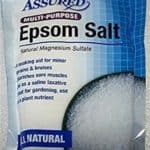
If you are beginning your garden experience, no doubt you have heard, or will hear of gardeners that are extolling the virtues of using Epsom Salt (Magnesium Sulphate) to amend their garden soil.
Claims include better germination, stronger plants, more disease resistant plant, more produce, tastier produce and etc…
And after all what gardener does not want these things?
So I began to research the topic in earnest.
To use, or not to use? Unfortunately, this article will not provide a definite conclusion for you either way.
Epsom Salt is not a salt at all. It is a combination of Magnesium and Sulphate, and was discovered in Epsom England. It has been used semi-medicinally for years for swollen joints, skin problems, bowel problems, and etc..
The Pros:
Using Epsom Salt in the garden seem counter intuitive because of the name “salt”. But you should know that healthy soils contain both Magnesium and Sulphate, which are required by plants to aid in nutrient absorption, development of chlorophyll, disease resistance and etc..
Again, what gardener does not want this for their garden plants?
According to my sister-in-law, who is a master gardener in my opinion, Epsom salt is great in the garden, especially for plants of the night shade family.
The Cons
However, in my research, I found enthusiastic gardeners expounding the wonderful benefits of using Epsom Salt in their gardens. But strikingly, I found no empirical data or studies to prove these claims and results.
In fact, I came across a couple of YouTube videos discounting the use of Epsom Salt in the garden.
Both of which appeared to be very well documented. I will include them at the bottom of this article. Their opinions should be heard… after all they do cite some actual studies.
The only semi-conclusive videos supporting the use if Epsom Salt in the garden was a lady showing 2 pepper (tomato ?) plants, potted at the same time, in the same soil and treated the same, except one plant was watered with an Epsom Salt solution. That plant appears to be doing better than the other. Those video will be at the bottom as well.
However, I could not find a follow up video regarding the harvest. And these are almost 10 years old.
And like my gramma always said, “the proof is in the pudding!” Talk is cheap! Show me the evidence! Convince me!
What is needed
What is needed (I’m challenging all beginner gardeners) is a double blind study (to use a terminology from the medical profession).
I don’t mean blindfold the plants, but take 2 identical plants, (tomatoes, potatoes, or peppers, I’ve heard night shades do the best with Epsom Salt).
Pot them at the same time in the same type of pot and same type of soil.
Water one with an Epsom Salt solution once a month. Take intermittent pictures and videos showing the progress, and continue all the way to harvest.
Then invite cousin Sue over for a blind fold test and have her indicate the tastier produce of the 2 plants.
This is what the internet needs to be more convincing that Epsom Salt use in the garden has real benefits.
Having said all this, there is a point that needs to be made. If the garden soil is rich and healthy, the use of Epsom Salt may not even be needed.
Composting and mulching has been shown to provide the required amounts of Magnesium Sulphate needed for healthy plants and tasty produce. (see articles on the Ruth Stout Method of Gardening, and the Back to Eden Method of Gardening.)
In which case, at best adding Epsom Salt to your gardening routine would just be needed until you have brought your soil up to the desired level of rich loamness (if that is even a word).
Comments from Gardeners disagree stating positive results.